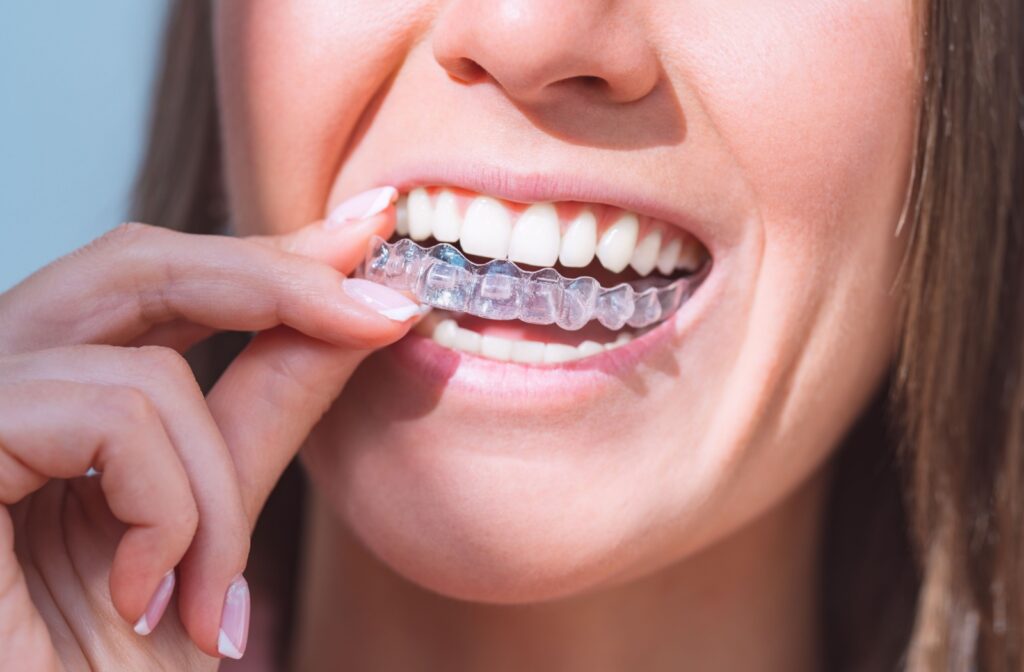A smile is often regarded as a person’s first impression, and straight, aligned teeth can play a significant role in that impression. Beyond aesthetics, the alignment of your teeth and jaw can also play a role in your overall oral health—and your bite.
An overbite is a type of dental misalignment–or malocclusion–in which the upper front teeth significantly overlap the lower front teeth vertically. Although a slight overbite is normal, if teeth overlap more than 2-4 mm, there is potential for jaw problems, tooth erosion and other dental issues.
For those affected by an overbite, it can be helpful to learn more about what causes this misalignment, its specific implications for your dental health, and the treatment options available to you, including orthodontics and Invisalign.
Understanding Overbites
Overbites and other misaligned bites are more than just aesthetic issues, and they can be addressed with help from a dentist and other oral health professionals. Because misaligned teeth can be challenging to clean and care for, correction is sometimes necessary to help people maintain optimal oral health.
What Are Misaligned Bites?
Misaligned bites can vary in type and severity. When left untreated, misaligned bites can lead to jaw pain, tooth decay, tooth loss, and gum disease.
The most common types of misaligned bites include:
- Overbites: Where the upper front teeth excessively overlap the lower front teeth.
- Underbites: Where the lower teeth protrude further than the upper teeth when the mouth is closed.
- Crossbites: Where 1 or more upper teeth do not align with corresponding/appropriate lower teeth.
- Overjets: Where upper front teeth protrude over the lower front teeth.
- Open bites: Where the back teeth are together, but there is an opening between the lower and upper front teeth.
Misaligned bites and teeth can impact chewing, speech, facial aesthetics, and oral hygiene. When you have any form of tooth misalignment, it’s important to seek professional dental care and treatments tailored to your individual needs and goals.
What Are the Signs of an Overbite?
While the most obvious sign of an overbite is noticing your top teeth sitting significantly far in front of your bottom teeth, there are some additional signs to look for, including:
- Tooth erosion (such as chipped or loose teeth, decay, and thinning enamel)
- Breathing issues
- Pain while chewing
- Jaw pain
- Cavities
- Speech challenges
How Does an Overbite Occur?
There are several factors that can impact the development of an overbite, including:
- Genetics: Genetics can often dictate the size of your jaw and teeth, which, if mismatched, can lead to an overbite.
- Nail biting: Biting on hard items like nails can pull front teeth forward, contributing to misaligned bites.
- Teeth grinding: When you clench, grind, or gnash your teeth, that grinding can change the alignment of your jaw.
- Tongue thrust: If your tongue presses too far forward, it may push out your teeth.
- Thumb sucking: Childhood habits like thumb sucking or prolonged pacifier use can exacerbate the development of an overbite.
- Crowding: Misaligned teeth due to early tooth loss or overcrowding can also contribute to overbite formation.
How to Correct Overbites
Fortunately, overbites can be correctable, especially when diagnosed early. Orthodontic treatments like braces and clear aligners like Invisalign can help shift the teeth and jaws into proper alignment. Your treatment options can depend on the severity of your overbite. In some cases, other dental appliances or surgical procedures may be recommended.
Braces
Braces are a common option for overbite correction. Through a combination of brackets, wires, and elastic bands, braces can gradually maneuver your teeth into the desired position. The duration of treatment varies for each person, with a commitment to regular adjustments and proper oral hygiene being crucial during the process.
Invisible Clear Aligners
Clear aligners, like Invisalign, can provide a more discreet alternative to traditional braces designed for your unique teeth. They can offer greater flexibility in lifestyle than traditional braces while helping ensure the corrective process remains consistently on track.
What Happens If an Overbite Goes Untreated?
Ignoring an overbite today might lead to more than just aesthetic concerns tomorrow. Untreated overbites can lead to several issues, such as dental erosion, chewing difficulties, and TMJ disorders.
Dental Erosion
When your teeth constantly rub against each other because they lack proper alignment, that can result in accelerated dental wear. Over time, your enamel may thin, leading to tooth sensitivity and a higher risk of developing cavities and tooth decay.
Chewing Difficulties
An overbite can lead to ineffective chewing, straining your digestive system and potentially contributing to issues like acid reflux, indigestion, and gastrointestinal discomfort.
TMJ Disorder
Your temporomandibular joint is crucial for everyday tasks like speaking and eating, and it can bear the brunt of an untreated overbite. Misaligned bites can cause the joint to dislocate, leading to symptoms of TMJ disorder like pain, clicking sounds, and difficulty opening or closing your mouth.
At What Age Should You Address Your Overbite?
The ideal time for correcting an overbite is typically during childhood or adolescence, when the teeth and jaws are still developing. However, this doesn’t mean adults can’t undergo successful treatments.
If you or your child are experiencing issues with an overbite, consider scheduling an appointment with us so we can provide an exam and talk about the right options for treatment.
How Genesis Dental Can Help
If you exhibit symptoms of an overbite, an exam with a dentist can be vital. At Genesis Dental in Surrey, we craft personalized treatment plans based on your needs, goals, and health—we put your needs and expectations first.
An overbite is more than just a dental concern—it’s a matter of health and confidence that deserves attention and awareness. By staying informed, recognizing the signs, and taking proactive steps, you can address an overbite with help from our dentists.
Book an appointment with us to learn more.




